
By Lana Sweeten-Shults
GCU News Bureau
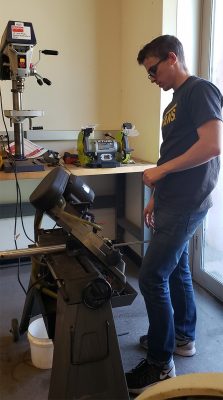
Two days to go, and Grand Canyon University’s Formula SAE Team is racing to the finish line to get its small-scale Formula-style race car to purr and hum and zip down the road.
It’s Saturday afternoon and, like bees buzzing from the flower to the hive and then to the flower and back again, the team skims between four machine shops on the first floor of the Engineering Building. It’s where they’ve been every weekend since classes ended in April, welding, cutting, painting, testing and completing system after system for GCU’s first student-built race car.
“We’re working on the gas tank right now. The electrical systems, as well -- installing that. I actually have to drive to Walmart and grab some things. We’re looking to put on the wheels later today,” said senior electrical engineering major Cory Cathrea, president of the University’s branch of IEEE (“I triple E,” as it's more popularly known, though officially it stands for the Institute of Electrical and Electronics Engineers).
“We were here until midnight last night,” said Cathrea, who drives from his internship job in Tucson back to GCU on weekends to work on the car.
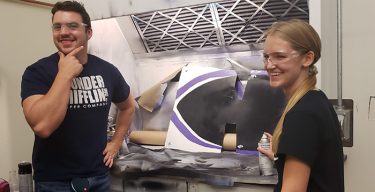
The team expected it would be in the engineering shops until midnight again, each day until their send-off at 1 p.m. today outside the Engineering Building. Twenty members of GCU’s 40-plus member Formula SAE Team, part of the University’s IEEE branch, will be hitting the road for a 19-hour drive to reach the Formula SAE Lincoln competition Wednesday through Saturday in Lincoln, Neb.
They will be competing against 79 other university teams and some 1,300 students from the United States and countries such as Canada, Mexico and Brazil.
Here’s the concept behind the Formula SAE student competition, which tests undergraduate and graduate students’ engineering design and project management skills: A fictional manufacturing company has contracted a design team to develop a small Formula-style, single-seat race car. The target marketing group is the nonprofessional weekend autocross racer. The prototype that students will present in Lincoln will be evaluated for its potential as a production item.
GCU’s Formula SAE Team delved into competition mode in the fall and hasn’t looked back. Students spent months designing the vehicle on a computer-aided design and engineering program called Solidworks. They met for presentations on research, materials cost and the like. They raised funds -- $8,300 from corporate sponsors Vector Launch, Jones Brothers Construction, Voodoo13, STAX3D, MobilTape and from friends and family. Then they broke off into subteams that oversaw certain systems of the car.
In January, they were given the green light, per competition rules, to start fabrication, checking in during the process with SAE (the Society of Automotive Engineers) Arizona.
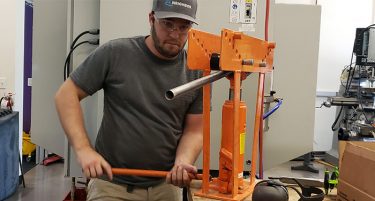
Dante Desimone, a junior mechanical engineering major, was in one of the engineering shops on Saturday with his team painting the cut panels that will be placed on the frame of the vehicle.
“I wanted to get as much experience as I can, in all regards, of mechanical engineering,” said Desimone of joining the Formula SAE team. “... A lot of times, in engineering schools, it’s just the theoretical and academic. But this is just really good hands-on and troubleshooting experience because everything goes wrong.”
“We’re finding that out this weekend,” team member Luke Sauers, an electrical engineering major, said with a laugh.
Sauers said he was in a class with Cathrea and found out about the IEEE Club through him.
“I saw they were going to be working on a car, and I was like, it sounds like a good way to get experience. Even though I’m electrical, there are some electrical components to the car. I learned a lot from just being in the shops,” Sauers said.
“A lot of us learned to weld through this -- and troubleshooting, that’s a major, major thing,” Desimone said. “Just being able to use these actual fabrication machines, like the lathe or the Haas (precision machining tool).”
Sauers added, “In class, we all experience doing small stuff (small team projects), but this is the first time we’re doing something where you’ve got different teams working on different parts. … It’s a good way to learn some of the real-world applications. It also allows me to experience something that’s not technically my major.”
While team members agree what they have learned on this project has been invaluable, the project also has had its challenges.
The team had to redesign the frame early on in the process, and the hoop, which protects the driver during rollover, had to be redone twice.
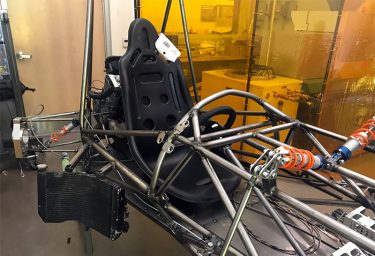
“Just getting everyone together in the same room at the same time to work was one of the challenges,” Cathrea said with a smile, “and just pulling together a lot of the designs and actually figuring out what we were going to do. This is a first-year team, so we don’t have any concrete, previous-year designs on our hands, so it’s kind of seeing what we can design in the time frame we have.”
“The most challenging thing for me was just having to learn what to do before you can do it,” said Brian Holm, lead of the team’s brakes crew, who hadn’t really worked on cars much before the competition and reveled at the chance to take on a leadership role with the team. It was the first time, he said, he has been in a leadership role.
Senior mechanical engineering major David Dina, who was in charge of the vehicle’s chassis, spent part of his Saturday welding the frame.
“We all have our individual groups and goals, and we all try to work together as best we can, but sometimes you don’t know what one person is doing, and you set something up that works one way and you find out it interferes with another team,” said Dina, who already is being forward-looking and thinking of process improvements the team can put in place for next year.
Of course, there’s still this week’s competition to think of.
Dr. Kevin Williams, Formula SAE Team faculty advisor, said in April how excited he is to see how GCU’s first-year team stacks up against other universities that have been competing in this event for years.
“This team is an exceptional group of students,” he said, adding how they have tackled this project largely on their own.
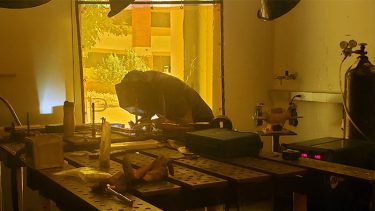
Once they get to Lincoln, teams on the first two days of competition go through a series of technical tests to make sure they comply with competition rules before being able to qualify to drive on the track. For example, teams go through a tilt test so judges can make sure the vehicle’s design won’t allow it to fall over at a certain angle. If teams do get to drive their vehicles for the judges, it’s not like NASCAR, with drivers racing against each other to see who’s the fastest. Only one car is allowed on the track at a time, and the vehicle is judged in various performance tests, such as handling, safety, acceleration, efficiency and performance.
GCU’s team, as of Saturday, had yet to test drive its vehicle -- something it’s hoping to do before today’s send-off. The team’s intention is to make it onto the track with a working, qualified race car.
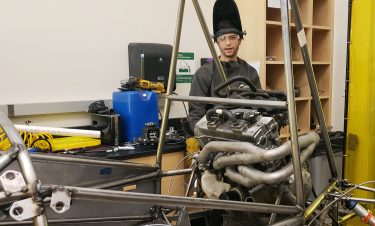
“A lot of people show up with just a model, not even a car. We’re going to show up with a car and, hopefully, pass the qualification (to race),” said Desimone.
In GCU’s first year at the competition, Desimone said the team will continue to learn how to improve for next year: “I’m not expecting us to place high on the podium or something. I’m expecting us to learn a lot. I want to be able to take everything we’ve done this year and turn it into something usable for next year. I don’t want to make this year a waste.”
Cathrea said the team intends to continue building its race car expertise.
“This is the first year we’re doing something like this,” he said. “We’re going to be doing it year after year. This isn’t a one-time deal; we’re not a one-hit wonder.”
GCU senior writer Lana Sweeten-Shults can be reached at [email protected] or at 602-639-7901.
****
Related content:
GCU Today: Students in driver's seat in race car build
GCU Today: "GCU club engineers hope for Ruby"
YouTube: Grand Canyon University IEEE Student chapter Appropriations Video



































































